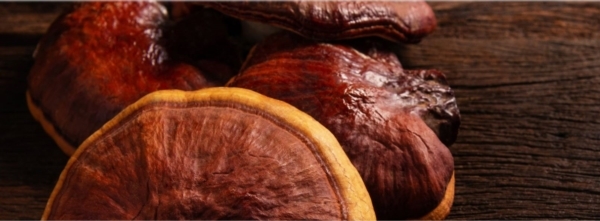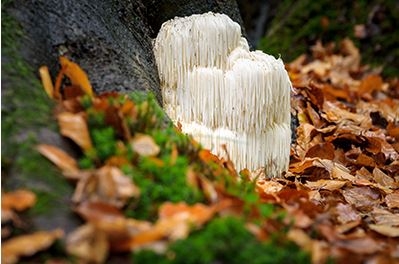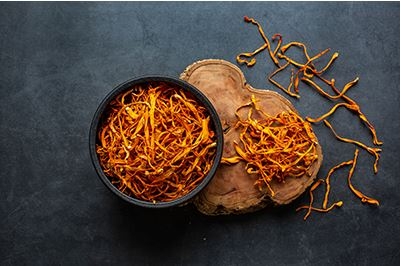
Studies that use hot-water extracts demonstrate immune upregulation. In contrast, studies that use alcohol extracts show the downregulation of immune-cell activity. This is likely due to the decreased potency of the IPS in alcohol extracts. In the case of medicinal mushrooms, polysaccharides are the star constituent for immune-enhancing properties, and hot-water extraction will provide the highest possible concentration.
Mushrooms for Immunity and Longevity
Reishi (Ganoderma lucidum)
With over 400 active constituents, reishi boasts an impressive résumé as an immune enhancer. Used for centuries in Chinese medicine and reserved as a delicacy only for emperors, reishi has been studied for anxiety, fatigue, and primarily anticancer effects. Its IPS mobilize an army of NK cells, and its triterpenes decrease inflammation. Reishi also contains germanium, which oxygenates cells and neutralizes pain during the end stages of cancer. In clinical trials, six months of reishi supplementation increased antioxidant content within the body and notably decreased incidence of fatty liver disease.
What Are Reishi Spores?
Spores are germ cells that are ejected from the cap of the fungus once mature, allowing the mushroom to replicate and grow. Think of them as miniature seeds. G. lucidum spores contain similar active constituents as those found in the fruiting body (the mushroom itself) and provides comparable therapeutic benefits. Amazingly, over 29 triterpenes have been isolated from G. lucidum spores, while only a few have been found in the fruiting body. Also, more than 40% of the spore content is composed of IPS. The clinical applications of reishi spores are still being studied, but it is holding its weight in immune-enhancing, neuroprotective, antiepileptic, anxiolytic, antitumour, and liver-optimization abilities. Reishi spores may be the next ultimate superfood due to the higher bioavailability of active constituents.
Cordyceps (Cordyceps militaris and Paecilomyces hepialis)
Both of these cordyceps species are grown and cultivated to perform similar therapeutic applications of their wild cousin, Cordyceps sinensis.
Traditionally used for fatigue and improving lung function, cordyceps have a high IPS content. In eight weeks, supplementation with cordyceps increased NK-cell activity while also activating T cells against tumour cells. Cordyceps also increases oxygen utilization by stimulating red blood cell formation. After three weeks of cordyceps supplementation, maximal oxygen consumption (V̇O2 max) and tolerance to high-intensity interval training (HIIT) increased. These studies are promising for individuals suffering with lung-health issues.
Lion’s Mane (Hericium erinaceus)
Conclusion
It’s safe to say that medicinal mushrooms—in any form—are beneficial to long-term health. Therapeutic benefits are maximized by taking a hot-water extract with validated polysaccharide and beta-glucan content. When starting supplementation with a medicinal mushroom, some people can experience cleansing reactions like pimples, sore muscles, dizziness, and bowel changes. These symptoms can signify an upregulation of the immune system and detoxification, and normally disappear within a short time frame. Naturopathic doctors can help you choose proper dosing. Superfungi are extraordinary creatures, but like many botanicals, concentrated doses and duration of use will ultimately result in robust immunity and longevity.




